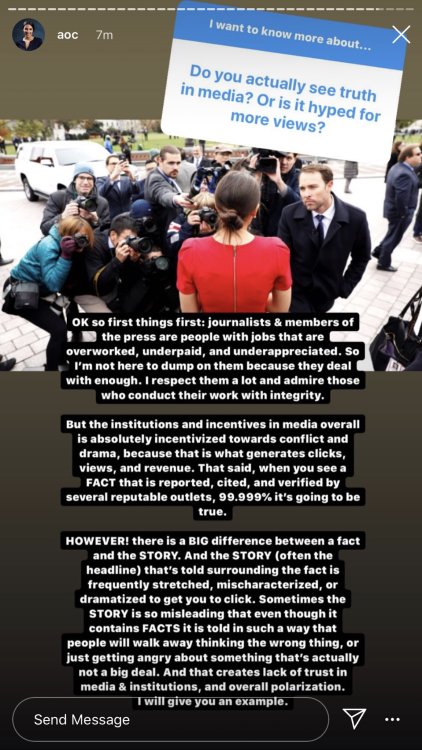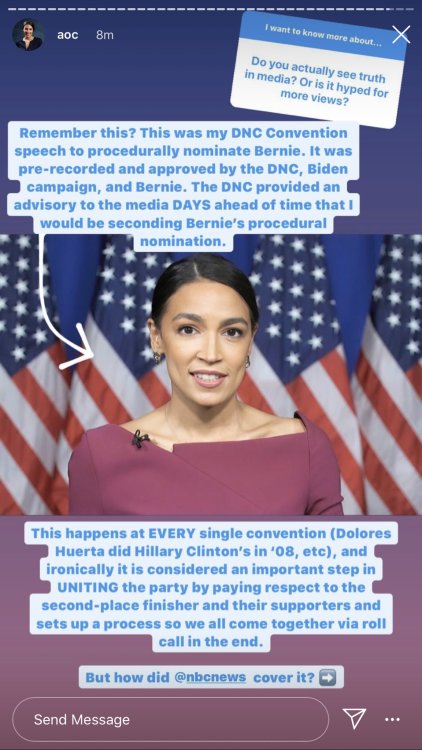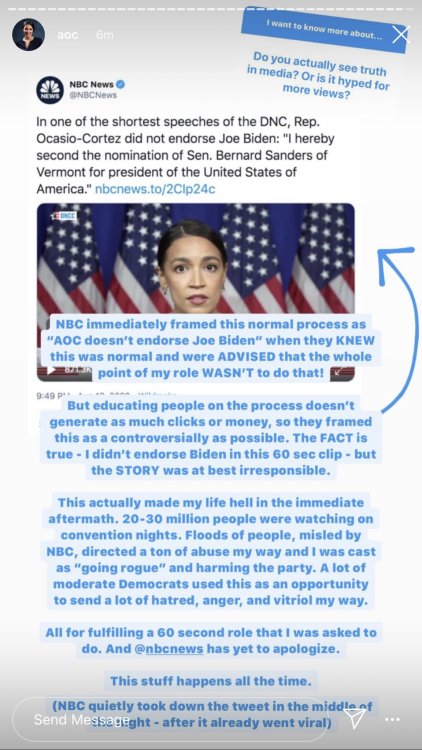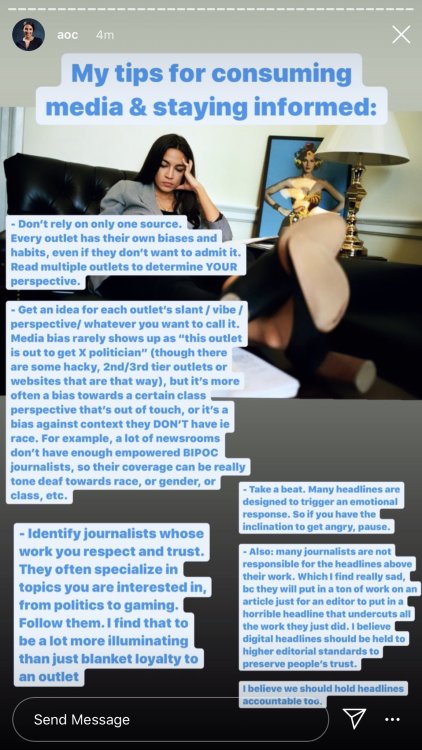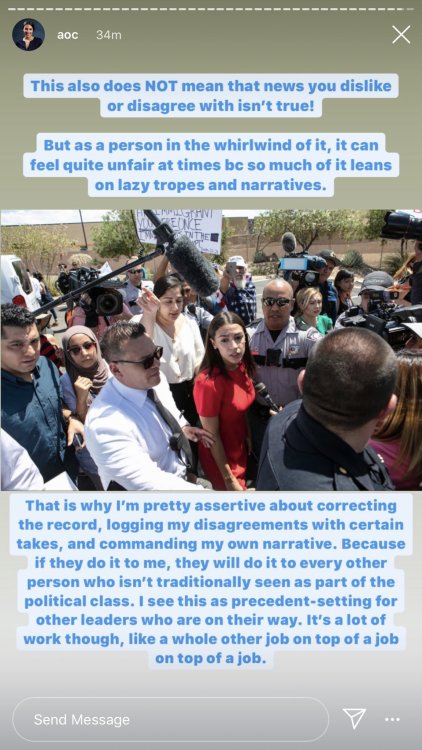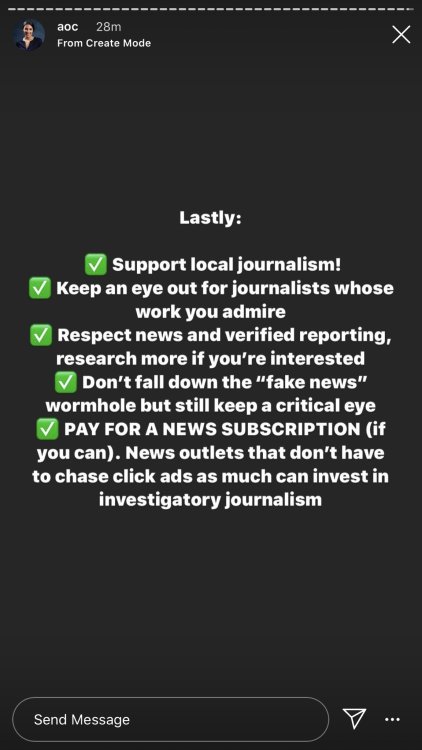livebloggingmydescentintomadness:elphabaforpresidentofgallifrey: rampantrainbows:elphabaforpreside
livebloggingmydescentintomadness:elphabaforpresidentofgallifrey: rampantrainbows: elphabaforpresidentofgallifrey: ok so AOC’s tips for consuming news critically are???? phenomenal??? they’re better than my entire undergraduate education in political communication. it took my entire career up until this point in news media to learn this stuff. she is SPOT on. to expand on a few of her points: 1) If you like a piece of reporting someone has done, follow the JOURNALIST, not the outlet. Digital news organizations come and go, traditional news lays people off, and freelancers don’t always work for the same place, but someone who really puts in the work that you come to trust their reporting is valuable. You have no idea what it means to be able to say “you know, I don’t know if I believe what all these news outlets are saying on this, but I know X reporter does a lot of work on this and I trust their work on it.” 2) In that same vein, you should trust public radio and print outlets more than TV (or YouTubers - both TV and YouTubers are looking for views and ad money). Seriously, I work in TV, and this is NOT a knock on TV producers at all, it’s just that TV has to work on a 24/7 news cycle, and sometimes they get stuff wrong because they have to do it quickly, or on a certain production schedule, or it has to be visual, or it has to get viewers. It is often the written/print reporters translating their scripts into published articles online who are doing the fact checking, if any. This isn’t to say all print and public radio is gospel (it sure as shit isn’t), but it’s a good place to start. 3) Most people can’t afford a news subscription, however if you can afford Spotify or Netflix, you should subscribe to your local newspaper or public radio station. What AOC doesn’t mention here about newspapers specifically, is that you need to REALLY check if that newspaper has a) been gobbled up by a hedge fund b) has some sort of weird conservative slant. Do some research first. Also, if you can’t afford a local newspaper subscription, 99.99% of the time your library card includes subscriptions to some sort of news service, that will get you behind many paywalls. Check your library system’s digital services for what news services they offer and how to log in. 4) Just think before you share. Before you reblog or retweet something, do a quick Google. Especially when someone is like “the news isn’t talking about this!” when there probably are articles about it, maybe even with further information. It really helps to look. All of this, cosigned by a newspaper reporter. I am impressed by how clear and nuanced AOC is on this issue. I wouldn’t be surprised if she’s discussed this with reporters before, it has the ring of an insider’s perspective. I would like to add/expand with: 1. Find out who owns your local newspaper in the city or county where you live. It’s on their masthead. There *are* independent publications still out there. While conglomerate ownership doesn’t automatically mean that a publication is bad - they’re the ones with the resources to dedicate to larger projects, after all - there are absolutely more complications that can be going on behind the scenes. I’ve seen wonderful independent papers turn to trash after a corporate buyout, because they cut their staff, chased off the good reporters, and inserted a corporate atmosphere where it didn’t belong. Also, larger papers aren’t automatically better than smaller ones. 2. Go regional or local as opposed to national news, whenever possible. Local reporters have their boots on the ground long-term and know their own communities. National media outlets are in and out in a short period of time, and they often miss nuance and detail. Local reporters have ins with the people they know, relationships built over time, that often give access to information CNN and etc don’t get. 3. Newspaper editorial pages are a forgotten art. Newspapers have an “editorial voice” of opinion editorials, often written by the editor in chief but occasionally written by an editorial board. Letters to the editor are from anybody and they don’t necessarily represent a publication’s views. The editorial voice -does-. That’s what you want to look at when determining what a newspaper stands for. 4. You can talk to reporters!!!!! Please talk to reporters!!!! We are not shadowy figures, we are people. Usually with very visible contact information. If you see a story that is unbalanced or incorrect, please pick up the phone or send an email to the reporter explaining what’s wrong. We want to know. No self-respecting reporter wants their byline on wrong information. Chances are good they will be happy to run a correction, or even want to do a follow up story to better explain or clarify the issue. Sometimes breaking news is chasing a moving target. That’s just the way life and deadline driven reporting works. We have to keep pushing, keep listening, keep asking. Don’t think you can’t influence that! You absolutely can. on point 4 - you can find reporters contact info a few ways a) click their byline (name) at the top of the article and it should go to some sort of author page. it should list their email or have an email button. b) look for a masthead page. this could be in the “about” “meet the team” sort of sections of the website, those will also have links to author pages or contact info c) look for the journalists on twitter. some are not very active on twitter but do list their emails in their bio. on point 2 - this also means that if there’s something going on in your community that you want the news to cover, don’t just @ a news outlet on social media, send a direct tip to a LOCAL reporter. national news outlets monitor local feeds, and local reporters aren’t the ones monitoring the social media accounts anyway. even if you can’t find their email, direct @ ing the reporter on twitter or instagram will go very far (check which platform the reporter uses most, it’s usually twitter). on correcting a mistake - if you see a headline or part of an article that is wrong, misleading or, yes even bigoted in some way, you can do something about it. again, direct contact with the person who wrote it helps, but you can also look on twitter and the masthead that i mentioned before if you find it on the website to find who the editor might have been. this depends on how big the paper/magazine/digital pub is, and what section it was in, so it might take some guessing. if you find who it probably was on the masthead, you can include their email when you email the reporter, especially if it involves a headline, which reporters often don’t write themselves. if you have to look on twitter, you can search twitter for the @ handle of the publication and then go to the “people” tab of the search and check people’s bios to see who MIGHT be the editor who worked on this, and either email or @ them too. also, if you’re emailing about something like, let’s say misgendering a trans person, or misleading language about a police shooting, it’s helpful to have backup. include links to things like the AP Style Guide (like how they recently updated to make it clear you should never say “officer involved shooting”, and you should capitalize Black), or the Trans Journalists’ Association style guide. If you’re trying to get them to cover a story you’ve seen on social media, include links to those posts. include links to other news outlets who have covered something to show this is important or to prove that other news outlets already made the correction you are asking for, or got it correctly the first time. *** oh and one last thing i forgot to mention! stop sharing screenshots of articles! if the article reported on something valuable share the link! you can share a screenshot with the link, but these days, clicks mean everything and reporters are screwed over when a post of a screenshot of their article goes viral but not the article itself. especially if its about a less visible issue, lots of clicks will tell the editors this is something they should allow their reporters to pursue more often. the only time you should share a screenshot rather than the article is when they are like a terrible outlet like f*x news that does not deserve your clicks but you’re holding them accountable, or its some awful opinion column you’re commenting on that you dont want to give any clicks. if you’re sharing an article on instagram, share a screenshot and pop that link in your bio/link tree at least! people worked hard to report on that! [image description:first photo: a picture of alexandria ocasio-cortez speaking to a group of reporters. over the top of the photo is a sticker that says: “i want to know more about… do you actually see truth in media? or is it hyped for more views?”text over the bottom of the photo reads:“ok so first things first: journalists & members of the press are people with jobs that are overworked, underpaid, and underappreciated. so i’m not here to dump on them because they deal with enough. i respect them a lot and admire those who conduct their work with integrity.but the institutions and incentives in media overall is absolutely incentivized towards conflict and drama, because that is what generates clicks, views, and revenue. that said, when you see a FACT that is reported, cited, and verified by several reputable outlets, 99.999% chance it’s going to be true.HOWEVER! there is a BIG difference between a fact and the STORY. and the STORY (often the headline) that’s told surrounding the fact is frequently stretched, mischaracterized, or dramatized to get you to click. sometimes the STORY is so misleading that even though it contains FACTS it is told in such a way that people will walk away thinking the wrong thing, or just getting angry about something that’s actually not a big deal. and that creates lack of trust in media & institutions, and overall polarization. i will give you an example.”second photo: a picture of alexandria ocasio-cortez in a red dress, standing in front of a row of american flags. text at the top of the photo has an arrow pointing to her face, and reads:“remember this? this was my dnc convention speech to procedurally nominate bernie. it was pre-recorded and approved by the dnc, biden campaign, and bernie. the dnc provided an advisory to the media DAYS ahead of time that i would be seconding bernie’s procedural nomination.” text at bottom of the photo reads:“this happens at EVERY single convention (dolores huerta did hillary clinton’s in ‘08, etc), and ironically it is considered an important step in UNITING the party by paying respect to the second-place finisher and their supporters and sets up a process so we all come together via roll call in the end.but how did @nbcnews cover it? ➡”third photo: screencap of a tweet from nbc news, which reads, “in one of the shortest speeches at the dnc, rep. ocasio-cortez did not endorse joe biden: “i hereby second the nomination of sen. bernard sanders of vermont for president of the united states of america.”” attached is the photo of aoc from the previous slide.text at bottom of photo reads:“nbc immediately framed this normal process as “aoc doesn’t endorse joe biden” when they KNEW this was normal and were ADVISED that the whole point of my role WASN’T to do that! but educating people on the process doesn’t generate as much clicks or money, so they framed as controversially as possible. the FACT is true - i didn’t endorse biden in this 60 second clip - but the STORY was at best irresponsible.this actually made my life hell in the immediate aftermath. 20-30 million people were watching on convention nights. floods of people, misled by nbc, directed a ton of abuse my way and i was cast as “going rogue” and harming the party. a lot of moderate democrats used this as an opportunity to send a lot of hatred, anger, and vitriol my way.all for fulfilling a 60 second role that i was asked to do. and @nbcnews has yet to apologize. this stuff happens all the time.(nbc quietly took down the tweet in the middle of the night - after it already went viral)”fourth photo: a picture of alexandria ocasio-cortez sitting in an office chair, reading from a folder, leaning her head in one hand and with her feet up on a desk. text over the photo reads:“my tips for consuming media and staying informed:- don’t rely on only one source. every outlet has their own biases and habits, even if they don’t want to admit it. read multiple outlets to determine YOUR perspective.- get an idea for each outlet’s slant/vibe/perspective/whatever you want to call it. media bias rarely shows up as “this outlet is out to get x politician” (though there are some hacky, 2nd/3rd tier outlets or websites that are that way), but it’s more often a bias against context they DON’T have, ie race. for example, a lot of newsrooms don’t have enough empowered BIPOC journalists, so their coverage can be really tone deaf towards race, or gender, or class, etc.- identify journalists whose work you respect and trust. they often specialize in topics you’re interested in, from politics to gaming. follow them. i find that to be a lot more illuminating than just blanket loyalty to an outlet.- take a beat. many headlines are designed to trigger an emotional response. so if you have the inclination to get angry, pause.- also, many journalists are not responsible for the headlines above their work. which i find really sad, bc they will put in a ton of work on an article just for an editor to put in a horrible headline that undercuts all the work they just did. i believe digital headlines should be held to higher editorial standards to preserve people’s trust.i believe we should hold headlines accountable too.”fifth photo: a picture of alexandria ocasio-cortez in the middle of a group of reporters and police. the text at the top of the photo reads:“this also does NOT mean that news you dislike or disagree with isn’t true!but as a person in the whirlwind of it, it can feel quite unfair at times bc so much of it leans on lazy tropes and narratives.”the text at the bottom of the photo reads:“that is why i’m pretty assertive about correcting the record, logging my disagreements with certain takes, and commanding my own narratives. because if they do it to me, they will do it to every other person who isn’t traditionally seen as part of the political class. i see this as precedent-setting for other leaders who are on their way. it’s a lot of work though, like a whole other job on top of a job on top of a job.”sixth photo: black background with text that reads:“lastly:✅ support local journalism! ✅ keep an eye out for journalists whose work you admire ✅ respect news and verified reporting, research more if you’re interested ✅ don’t fall down the “fake news” wormhole but still keep a critical eye ✅ PAY FOR A NEWS SUBSCRIPTION (if you can). news outlets that don’t have to chase click ads as much can invest in investigatory journalism” /end image description] -- source link
